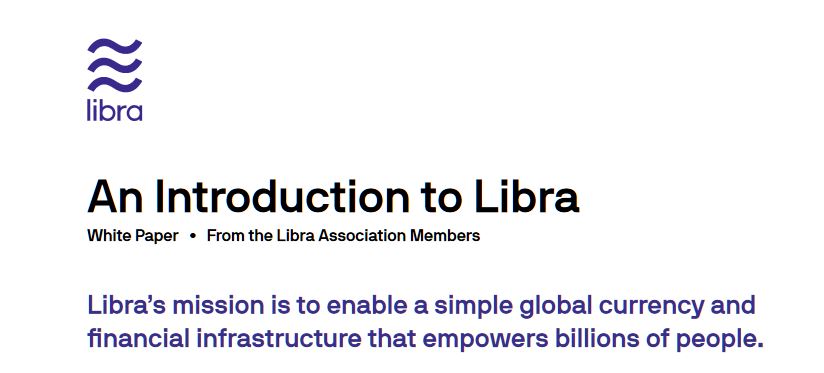Facebook released their while paper , and it poses a threat to current payment systems. The 29-page paper describes a protocol designed to evolve as it powers a new global currency.

“The Libra Blockchain is a decentralized, programmable database designed to support a low-volatility cryptocurrency that will have the ability to serve as an efficient medium of exchange for billions of people around the world.”
As Libra is a stablecoin, it will have less volatility than a crypto like Bitcoin as it’s tied to the value of real-world currencies. It’s potential is huge.
All over the world, people with less money pay more for financial services. Hard-earned income is eroded by fees, from remittances and wire costs to overdraft and ATM charges. Payday loans can charge annualized interest rates of 400 percent or more, and finance charges can be as high as $30 just to borrow $100.4 When people are asked why they remain on the fringe of the existing financial system, those who remain “unbanked” point to not having sufficient funds, high and unpredictable fees, banks being too far away, and lacking the necessary documentation.
Behind it, is the Libra Association, which is an independent, not-for-profit membership organization based in Geneva, Switzerland. “Members of the Libra Association will consist of geographically distributed and diverse businesses, nonprofit and multilateral organizations, and academic institutions.”
Founding members include:
- Payments: Mastercard, PayPal, PayU (Naspers’ fintech arm), Stripe, Visa
- Technology and marketplaces: Booking Holdings, eBay, Facebook/Calibra, Farfetch, Lyft, MercadoPago, Spotify AB, Uber Technologies, Inc.
- Telecommunications: Iliad, Vodafone Group
- Blockchain: Anchorage, Bison Trails, Coinbase, Inc., Xapo Holdings Limited
- Venture Capital: Andreessen Horowitz, Breakthrough Initiatives, Ribbit Capital, Thrive Capital, Union Square Ventures
- Nonprofit and multilateral organizations, and academic institutions: Creative Destruction Lab, Kiva, Mercy Corps, Women’s World Banking
The reaction from the fintech industry has been positive, though others are concerned about privacy, and risk from Facebook’s existing reach, and are calling for an inquiry into the proposal before it continues. Which ever way you look at it – this is big news.
The fintech industry has expressed excitement over the announcement by Facebook that it was set to introduce a new cryptocurrency to market with the help of some of the biggest names in tech, via InvestorDaily.
The cryptocurrency, dubbed Libra, has been announced by a Facebook white paper stating their mission to empower billions worldwide to enter the financial market.
“The mission for Libra is a simple global currency and financial infrastructure that empowers billions of people,” said the white paper.
The move has been met with excitement by industry players, and general manager of FinTech Australia Rebecca Schot-Guppy said such a rollout would open up new markets and promote fintech innovation.
“Another exciting prospect out of this is that Facebook’s reach may also help finally educate the public on the power of blockchain and cryptocurrency. Calibra [digital wallet for Libra] could take these technologies mainstream and put them at the fingertips of every Australian,” she said.
Co-founder and co-chief executive of Assembly Payments Simon Lee said it seemed like Facebook’s attempting to copy what WeChat and Alipay had done in China.
“We see Calibra as Facebook’s attempt to roll out what is happening in China to the rest of the world. They’ve seen the opportunity and have the scale to execute on it,” he said.
The currency will be built on the Libra blockchain and backed by a reserve of assets designed to give it intrinsic value, but perhaps the biggest nod to consumers is that it will be governed by an independent association.
Facebook has been plagued with user privacy controversies, which would lead many consumers to be sceptical to integrate the social media platform with their financial lives.
However, the Libra Association is their attempt to placate those voices by establishing it as a governing entity that is made up of the likes of Visa, Mastercard, Uber, eBay, Spotify and Vodafone.
The association, according to the white paper, will facilitate the operation of the blockchain and manage the Libra reserve, making them the only party able to mint and burn coins.
The association notes in the white paper that it is important to move towards increasing decentralisation to ensure that there remains a low barrier to entry for the network.
The chief executive of neobank Maslow, Kane Jackson, said the association’s concept showed that Facebook was aware of what was required in order for the coin to thrive.
“Facebook seems to understand that widespread adoption of finance-based products will not be achieved without the decentralisation of their governance and a community-inclusive approach to managing them,” he said.
Facebook has also launched a subsidiary company called Calibra that will handle its crypto dealings in an effort to separate user privacies, meaning Libra payments will not intermingle with Facebook data.
Despite Calibra operating as its own app, the wallet will integrate directly into WhatsApp and Facebook Messenger to utilise the vast network of Facebook to promote cryptocurrency.
It is this network promotion that excites Jasper Lawler, head of research at London Capital Group, who said the network would open other cryptocurrencies to billions.
“Libra will breed familiarity of cryptos to a much wider audience. Two billion people will now be much more open to Bitcoin and other altcoins,” he said.
As Libra is a stablecoin, it will have less volatility than a crypto like Bitcoin as it’s tied to the value of real-world currencies, Mr Lawler said.
“The different properties of a stablecoin compliment rather than compete with cryptocurrencies like Bitcoin, Ethereum and Ripple. Being pegged to regular currencies make stablecoins less volatile and more suited to payment processing,” he said.
The announcement saw an overnight rally for Facebook, but the community will have to wait to see how the rollout of the coin goes as no launch date has been set
